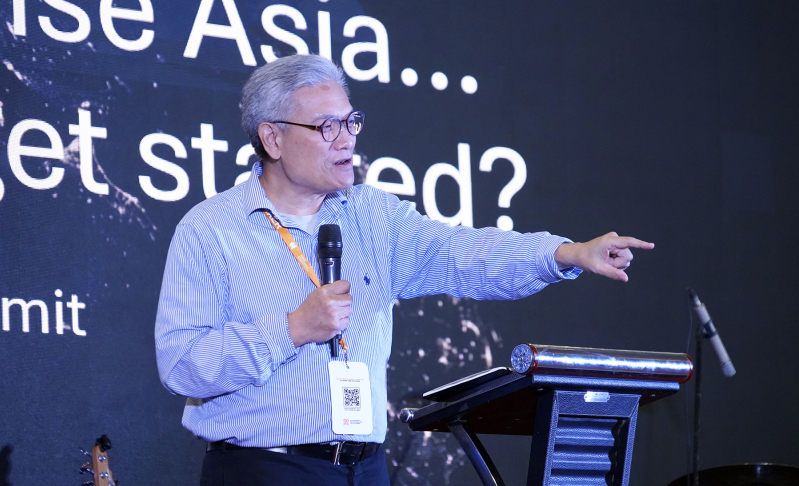
The Arise Leadership Summit opened Monday with a keynote address from Rev. Dr. David Ro, co-founder and executive director of Arise Asia, who urged participants to cultivate both public leadership and private spiritual integrity as Asia increasingly shifts from a mission field to a mission force.
The four-day event, held in Indonesia, gathered nearly 300 Christian leaders and youth from 22 countries across Asia and beyond. The majority of participants are from Generation Z, joined by senior mentors and ministry leaders committed to equipping the next generation for cross-cultural missions.
In his opening remarks, Ro framed the week as a time to “celebrate God’s work” across Asia, while cautioning against a leadership culture overly focused on visibility and performance. Drawing on a conversation with Singaporean pastor Edmund Chan, Ro introduced a guiding framework distinguishing between “platforms” and “pathways.”
“Platforms represent our work, while pathways reflect our walk,” Ro said, quoting Chan. “One is public, the other personal. One is what we do, the other is who we are becoming.”
He emphasized that both aspects are necessary in leadership but warned that the external often overshadows the internal. “Influence without integrity is dangerous and blind,” he added.
Ro encouraged participants to reflect not only on the visible aspects of ministry—titles, programs, social media presence—but also on the spiritual processes shaping them privately. “Let’s remember that what God sees beneath the surface is just as important as what people see on the platform,” he said.
Asia as a mission force
Ro transitioned to the theme of Asia’s emerging role in global missions. Citing demographic and economic trends, he noted that Asia—home to 4.5 billion people and 58% of the world’s population—is increasingly influential not only in global affairs but also within the global church.
“The church in Asia is maturing. It is growing, becoming indigenous and self-sustaining,” he said.
While acknowledging the diversity of religious contexts across the continent—from majority-Christian nations to countries with less than 1% Christian population—Ro said many Asian churches are now in a position to send rather than merely receive missionaries.
“There’s a transition taking place—from receiving to giving,” Ro said. “Some churches in Asia are still in the early stages, but many are ready to contribute, send, and support missions.”
He likened this shift to his own family experience, where adult children who once depended on their parents now contribute financially. “It’s time for Asia to stop waiting for others and start stepping up.”
An emerging new movement
Ro provided a detailed account of how the Arise movement developed over the past several years. It began in 2018 when he and other regional directors from the Lausanne Movement and the World Evangelical Alliance (WEA) met in Wheaton, Illinois, and began planning for an Asia-focused missions congress.
The vision expanded as leaders from Asia Theological Association, the Evangelical Fellowship of Thailand, and other networks joined the initiative. Despite theological and institutional differences among groups, they formed a joint steering committee and began organizing an Asia Congress that was originally planned for 2020.
“Movements don’t naturally work together,” Ro said. “But somehow, this one did.”
The COVID-19 pandemic postponed initial plans, and the Asia Congress was held online in 2021 drawing over 1,300 participants. The following year, an in-person Congress was held in Bangkok with some 600 pastors and mission leaders from across the region.
It was at that 2022 Asia Congress that a vision was cast to launch Arise Asia to focus specifically on mobilizing the younger generation. Only nine months later, the Arise Asia 2023 Congress was held in Bangkok with 1,800 attendees from 37 countries and 14 language groups, marking the beginning of the Arise movement.
Ro emphasized that Arise Asia was not simply built around one individual or organization. “It started even before the name ‘Arise’ existed,” he said. “It’s the result of years of quiet labor, cooperation, and spiritual conviction among Asian leaders.”
Gen Z’s role in missions
Ro devoted a significant portion of his address to the role of Generation Z in the future of missions. He described the generation as idealistic and willing to sacrifice for causes they believe in.
Recalling a visit to Hong Kong during the 2019 protests, Ro said he saw teenagers on the streets enduring danger and discomfort for the sake of political ideals. “That made me wonder—what if that same generation channeled their passion toward the gospel?”
He contrasted this with common stereotypes about Gen Z being fragile or noncommittal. “People told me not to challenge them, that they wouldn’t respond to a long-term call,” Ro said. “But when we did challenge them, they came forward.”
At the 2023 Arise Congress in Bangkok, 229 youth committed to long-term cross-cultural missions. Ro said this showed a significant shift from earlier assumptions about younger generations.
“We’re seeing more willingness among Gen Z to say ‘yes’ to difficult things,” Ro said. “Even to go to places where they may face hardship or even danger.”
He shared a story of five young people who recently deployed to serve among unreached communities along the border of two Southeast Asian countries—an area with limited gospel access. Their experience meant adjusting to unfamiliar environments, including discovering a five-foot snake found in a bathtub, illustrating the kind of challenges missionaries face but also emphasizing the determination to overcome.
“This isn’t about hype or big events,” Ro said. “It’s about real people going to real places with the gospel.”
China’s transition from mission field to mission force
Ro spoke about his years as a missionary in China and the lessons he learned from the house church movement. He described witnessing the transformation of the Chinese Church from one that relied on foreign support to one ready to fund and send its own missionaries.
He recalled a conversation with Chinese leaders during preparations for an international congress, where they insisted on raising their own funds and even supporting delegates from neighboring countries.
“They said, ‘We’re not asking for scholarships. We’re raising the money ourselves,’” Ro said. “That’s the mission force mindset.”
Ro added that the experience helped shape Arise’s approach to mobilization, emphasizing local ownership and long-term sustainability.
“We want to see churches across Asia follow that model—not dependent, but determined to give,” he said.
A Biblical mandate, not a Western model
In the final section of his address, Ro addressed critiques that cross-cultural missions are rooted in colonialism or Western imperialism. He acknowledged historical missteps by Western missionaries but argued that the biblical foundation for missions remains valid and necessary.
“Thank God for the Hudson Taylors and William Careys who brought the gospel to Asia,” Ro said. “Let’s learn from their mistakes—but let’s not abandon their calling.”
He cited Romans 15:20, where the Apostle Paul expresses his ambition to preach the gospel where Christ has not been named, and verse 24, in which Paul asks the Roman church to support his journey to Spain.
“That’s not colonial. That’s biblical,” Ro said. “It’s a model rooted in Scripture, not in the West.”
Ro concluded by reaffirming Arise Asia’s commitment to biblical missions, sending, and sacrifice.
“We are not going back to the West,” he said. “We are going back to the Bible. And we’re calling the Asian church to rise and bring the gospel to those who have never heard.”
The Arise Leadership Summit continues through Thursday, July 31, with plenary sessions, workshops, worship and prayer designed to equip participants for leadership and missions.
“This is not just about another event,” Ro said in closing. “It’s about a generation stepping into its calling—for the nations, for the gospel, for the glory of God.”





